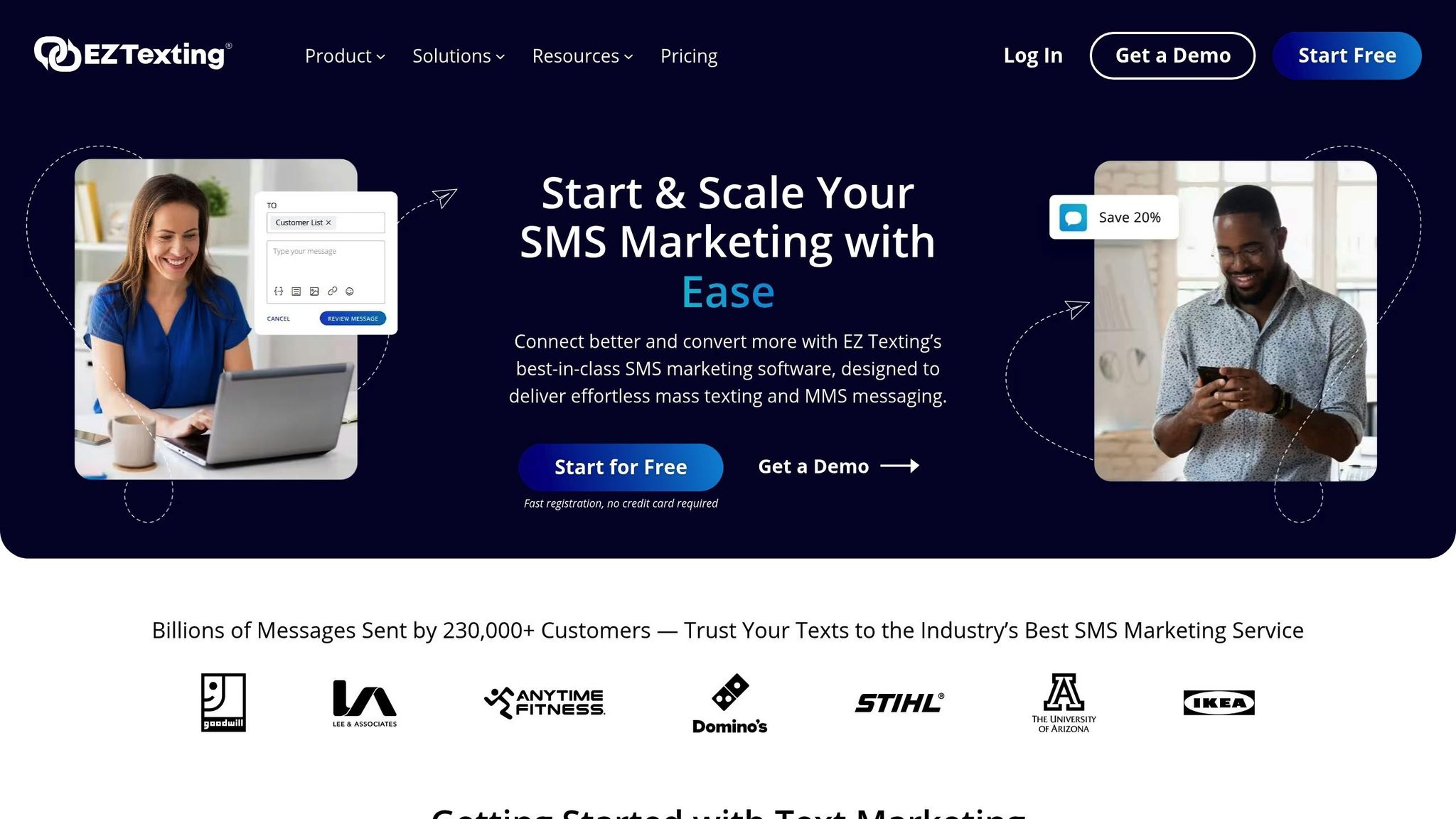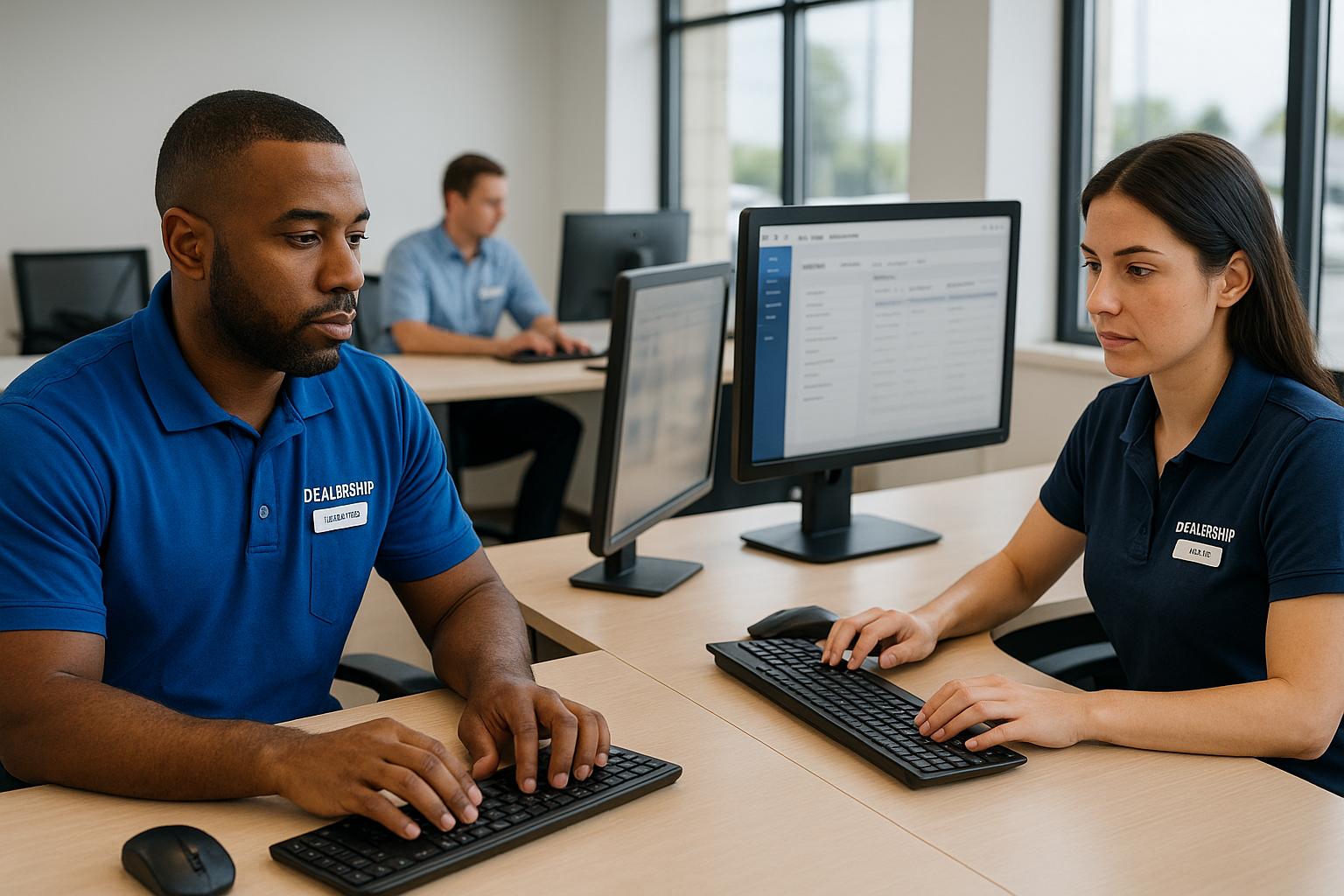Text messaging is now the preferred way for car buyers to communicate with dealerships. Why? It’s faster, less intrusive, and fits seamlessly into their busy lives. With a 98% open rate and response times averaging just 90 seconds, SMS outperforms phone calls and emails in every key metric. Here’s what makes SMS stand out:
- Higher engagement: Texts get read and replied to faster than emails or calls.
- Convenience: Buyers can respond on their own time without interruptions.
- Personalized communication: Messages tailored to individual needs feel more relevant.
- Faster lead response: Reaching out via SMS within minutes improves conversion rates.
- Low-pressure experience: Buyers feel more comfortable and in control.
For dealerships, adopting SMS isn’t just about keeping up with trends - it’s about meeting customer expectations and driving better results. The numbers don’t lie: dealerships using SMS report higher satisfaction rates, faster sales cycles, and improved engagement with leads.
Text Messaging for Vehicle Dealers | EZ Texting

1. Better Engagement and Open Rates
SMS campaigns are proving to be a game-changer in reaching car buyers, offering standout metrics that ensure messages grab attention.
Engagement Rate
Text messages boast a 42% read rate and a 10% click-through rate, easily surpassing email's 32% read rate and 3.8% click-through rate[2]. Even more impressive, text response rates soar to 45%, nearly eight times higher than email[9]. Why? It comes down to how people use their phones. Unlike emails, which often get buried in overcrowded inboxes, text messages land directly on the home screen, making them hard to miss. This directness translates to higher engagement and quicker actions from potential buyers.
Response Time
Speed matters in automotive sales, and SMS delivers like no other. Research shows that 90% of people reply to a text within 30 minutes[8], with many responding in as little as three minutes[2]. This rapid back-and-forth enables real-time conversations, helping dealerships guide buyers through the sales process with unmatched efficiency. For today’s fast-paced consumers, this immediacy is not just a perk - it’s an expectation.
Buyer Convenience
Today’s car buyers value communication that fits seamlessly into their busy lives. SMS offers a level of flexibility that phone calls simply can’t match. Buyers can read and reply to texts during short breaks, making it easier to stay engaged without disrupting their day. This shift is evident in the rising preference for texting: between service visits, usage climbed from 32% in 2020 to 40% in 2023[2][7].
The results speak for themselves. Carlson Chevrolet, for example, adopted a text-first approach and saw a 28% increase in monthly sales, jumping from 70 to over 90 vehicles - all without spending more on advertising[2].
2. More Convenient and Flexible for Buyers
Buyer Convenience
Car buyers often juggle packed schedules, making it tough to stay on top of dealership communications. SMS provides a simple, non-intrusive way for buyers to get updates on their own time. It’s a channel that respects their schedule, allowing them to engage with dealerships when it’s most convenient for them[11].
Here’s the proof: 37% of potential car buyers prefer dealerships to communicate via text during the purchasing process, and nearly half (47%) want to continue receiving texts even after completing their purchase[12]. Unlike logging into online portals or dealing with tedious phone menus, SMS delivers messages straight to the home screen, making it easy for buyers to open and respond whenever they’re ready[10]. Plus, the quick nature of SMS ensures updates are seen and acted on without delay.
Response Time
SMS doesn’t just offer convenience - it’s also fast. A staggering 82% of text messages are read within five minutes, and the average response time is just 90 seconds. Compare that to email, where the average response takes a sluggish 90 minutes[12][14]. This speed allows dealerships to reach buyers quickly while still giving them the freedom to respond on their terms.
The numbers speak for themselves: 88% of consumers ignore calls from businesses or unknown numbers, but SMS boasts an impressive 98% open rate[13]. And with 75% of people checking their phones within 30 minutes of waking up[13], a well-timed morning text from a dealership is almost guaranteed to be noticed.
Personalization
Fast responses pave the way for personalized, timely communication that keeps buyers engaged. Texting is a natural fit for tailored interactions - 60% of customers prefer using SMS to resolve support issues[13]. For dealerships, this means they can send real-time updates, such as confirming appointments, sharing vehicle availability, or following up on test drives, without interrupting the buyer’s day[2].
What’s more, 59% of consumers would rather receive direct messages from businesses than download yet another app[13]. By leveraging SMS, dealerships can meet this preference head-on, offering a direct, efficient way to stay connected while empowering buyers to remain in control of the conversation.
3. Quicker Response Times and Better Speed-to-Lead
Response Time
In automotive sales, every second counts. Reaching out to a lead within 5 minutes makes you 100 times more likely to have a meaningful conversation compared to waiting 30 minutes. Responding in under a minute? That can drive a 391% increase in lead conversions[16].
This is where SMS shines. Texting boasts an average response rate of 45%, leaving phone calls and emails far behind, with response rates as low as 6%[6]. AJ Chan, COO of Textline, underscores this advantage:
"On average, it takes 90 seconds to respond to a text – and 90 minutes to respond to an email!"[6]
With 98% of text messages opened and read within minutes[15], SMS offers dealerships a fast and reliable way to engage leads - right when it matters most.
Engagement Rate
Texting isn't just faster; it’s what most leads actually prefer. Studies show that 90% of leads would rather receive a text than a call[6]. Meanwhile, dealerships relying on phone calls alone face a harsh reality: over 66% of leads don’t get a response within 24 hours, and 37% are mishandled or lost entirely[16]. Considering that 97% of Americans send at least one text message daily[15], it’s clear why SMS is the go-to communication channel for modern buyers.
Buyer Convenience
SMS doesn’t just win on speed - it’s also about flexibility. The car-buying process often involves quick decisions and urgent questions, and texting fits perfectly into this dynamic. Unlike phone calls, which require both parties to be available at the same time, texts let buyers respond when it’s convenient for them.
This convenience is a game-changer. 78% of buyers go with the company that responds first[16], and after just 5 minutes, the chances of qualifying a lead drop by 80%[16]. Add to that the fact that 57% of buyers make a purchase within 3 days of initial contact[16], and the importance of SMS becomes crystal clear.
Another advantage? SMS allows sales teams to juggle multiple conversations at once, ensuring no lead slips through the cracks. It’s a scalable, efficient solution that keeps dealerships responsive and competitive in a fast-paced market.
4. More Personal and Relevant Messages
Personalization
SMS messaging offers dealerships a unique advantage: the ability to craft messages that feel personal and relevant. Unlike impersonal phone calls, text messages allow businesses to leverage customer data to create targeted campaigns. A great example of this comes from BMW, which used a text campaign featuring images of customers' specific car models equipped with winter tires. The result? A 30% boost in sales[17].
What makes SMS even more effective is its scalability. Dealerships can easily include customer names, reference previous purchases, or send maintenance reminders based on vehicle history. Instead of coming across as a sales pitch, these messages feel like helpful nudges. This approach not only makes outreach more personal but also leads to higher engagement rates.
Engagement Rate
Personalized SMS campaigns deliver impressive engagement results. Tailored messages can increase engagement rates by up to six times[20]. For instance, Bill Dickason Chevrolet achieved $231,000 in gross profit by sending just one or two highly relevant texts per month[17]. Additionally, research shows that dealerships using text marketing have seen a 30% average increase in customer engagement rates[18]. The ability to segment audiences and send offers that align with buyers' preferences plays a big role in this success. By delivering messages that resonate, dealerships not only capture attention but also enhance the overall customer experience.
Buyer Convenience
Another strength of personalized SMS lies in its convenience for buyers. Customers receive information tailored to their schedules and needs, which aligns with modern communication preferences. Muhammad Yasin, Vice President of Marketing at PERQ, highlights this shift in consumer behavior:
"Clearly, these results indicate that dealerships should not be looking at phone calls as their communications priority: consumers are telling them that text or email is better, and less intrusive."[19]
In addition, SMS provides a clear record of important details such as pricing, specifications, and appointment times. This transparency simplifies the car-buying process, making it not only more efficient but also more customer-friendly through tailored communication.
5. Less Pressure and Higher Customer Satisfaction
SMS isn’t just about speed and engagement - it also creates a more relaxed and comfortable experience for buyers, which can significantly enhance customer satisfaction.
Buyer Convenience
Text messaging offers a low-pressure alternative to traditional communication methods. Unlike phone calls that often demand immediate decisions, SMS gives buyers the freedom to review information on their own schedule. This is especially valuable for major purchases like cars. In fact, 68% of customers prefer texting during a service visit, and 40% favor it between visits [1][2]. Texting respects their time and allows them to engage when it suits them best.
Take Carlson Chevrolet as an example. By adopting a text-first approach, they increased their monthly car sales from 70 to over 90 - without spending more on advertising.
Response Time
Texts also strike a balance between being quick and unobtrusive. Since they don’t interrupt meetings or family moments, 90% of people respond within three minutes [2]. This makes SMS a practical and efficient tool for both businesses and customers.
Engagement Rate
A relaxed texting approach naturally encourages higher engagement. Consider this: 93% of U.S. consumers enjoy texting, and among car buyers, 87% feel better informed, while 82% report feeling fully prepared for their purchase [3][21]. By sharing information without applying high-pressure tactics, SMS builds trust and strengthens the buyer-seller relationship. This aligns perfectly with the expectations of modern car buyers, who value being in control of their purchase journey [17].
SMS vs Phone Calls Comparison
Expanding on the earlier discussion about the benefits of SMS, it's clear why text messaging is transforming how dealerships communicate. With an impressive 98% open rate and average reply times of just 90 seconds, SMS significantly outperforms phone calls in terms of both efficiency and engagement[2][6].
One of the biggest advantages of SMS is its non-intrusive nature. It allows customers to respond at their convenience, fitting seamlessly into their daily routines. Compare this to phone calls, which often go unanswered or require repeated attempts to connect. While emails take an average of 90 minutes to garner a response, text messages elicit replies in just 90 seconds[6].
Here’s a side-by-side comparison of SMS and phone calls to highlight the key differences:
| Factor | SMS | Phone Calls |
|---|---|---|
| Open/Answer Rate | 98%[2] | 6%[6] |
| Response Time | 90 seconds[6] | Often unanswered |
| Read Within 3 Minutes | 90%[2] | N/A |
| Customer Preference | Convenient, fits their schedule | Disruptive, interrupts routines |
| Engagement Rate | 45% average response[6] | Much lower |
| Personalization | Highly targeted, 6× better engagement[22] | Limited options |
The data makes one thing clear: SMS isn’t just more effective - it’s also better aligned with customer preferences. For example, a Chevrolet dealership that prioritized texting reported that 91% of their CarGuru leads exchanged two or more text messages[5]. Achieving that level of interaction through phone calls would be nearly impossible.
On top of that, SMS delivers measurable results. With a 19.3% click-through rate[4], text messages are a powerful tool for driving actions like scheduling test drives or encouraging customers to explore vehicle listings. It’s no wonder dealerships are increasingly relying on SMS to streamline communication and boost engagement.
Conclusion
The move toward SMS communication in automotive sales marks a major shift in how customers prefer to connect with dealerships. The numbers paint a clear picture: 75% of dealerships already use SMS and report noticeable improvements in customer engagement, surpassing what phone calls can achieve[2].
Texting offers the convenience and flexibility modern buyers crave. Whether they’re comparing vehicles during a lunch break or checking on financing options after hours, SMS allows them to engage on their schedule. This approach removes the pressure often linked to traditional sales methods, creating a more comfortable experience.
This shift isn’t just beneficial for customers - it’s a game-changer for dealerships. Faster response times, higher engagement, and more satisfied customers translate into better lead conversion rates and higher sales. With the ability to send personalized, targeted messages, dealerships can make every interaction count.
"Customers prefer it, and dealerships find it to be an effective communication tool." - Clarity Voice[2]
SMS also stands out because it appeals to a broad audience, cutting across all age groups. This makes it an effective way to connect with today’s diverse car buyers.
As highlighted, SMS is reshaping customer interactions and improving dealership operations. With consumer preferences leaning more toward digital-first experiences, dealerships that adopt SMS are better equipped to meet these expectations, streamline their processes, and achieve long-term growth. In today’s competitive automotive market, SMS isn’t just a helpful tool - it’s essential for staying ahead.
FAQs
Why do car buyers prefer texting over phone calls when communicating with dealerships?
Texting provides car buyers with a hassle-free way to connect with dealerships. Unlike phone calls, it gives customers the flexibility to reply when it suits them, without the pressure or disruption of a live conversation. Plus, with an impressive 98% read rate, messages ensure that important updates or offers are almost always seen quickly.
This method also matches today’s preference for fast, no-fuss communication. It shortens response times, minimizes misunderstandings, and adds a personal touch to interactions. For dealerships, this means meeting customer expectations more effectively while boosting satisfaction and engagement.
Why do car buyers prefer texting over phone calls when communicating with dealerships?
Car buyers gravitate toward texting because it’s fast, convenient, and effortlessly fits into their packed schedules. Unlike phone calls, texting gives them the freedom to reply when it’s convenient, without the pressure of answering right away. This makes the interaction feel far less intrusive.
Another advantage? Texting creates a written record of conversations, which comes in handy for keeping track of important details like pricing, appointment schedules, or promotional offers. It’s also a discreet option - perfect for those who can’t step away for a phone call during work or other commitments.
In short, texting aligns with the way today’s consumers prefer to communicate, offering a quick, adaptable, and hassle-free connection with dealerships.
What are the best ways for dealerships to use SMS to boost customer engagement and sales?
Dealerships can boost customer engagement and drive sales with SMS by focusing on three key elements: personalization, timing, and value. Start by creating a subscriber list of customers who have shown interest, and segment it so messages are tailored to specific groups. This ensures your communication feels relevant and meaningful.
SMS works well for sending quick updates about promotions, new arrivals, service reminders, or event invitations. Keep your messages concise, clear, and action-focused - like including a link to schedule a test drive or redeem an offer.
To expand your reach, promote your SMS contact details across your website, social media channels, and in-store. By consistently following up with helpful and relevant updates, you can build trust, strengthen customer relationships, and ultimately increase sales.
.avif)











.svg)

